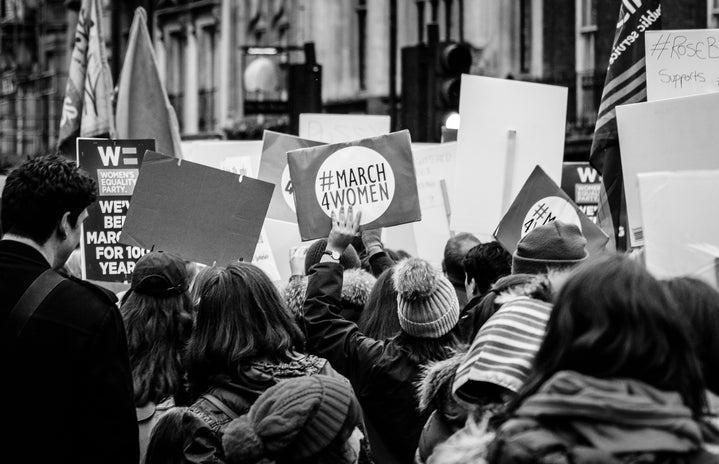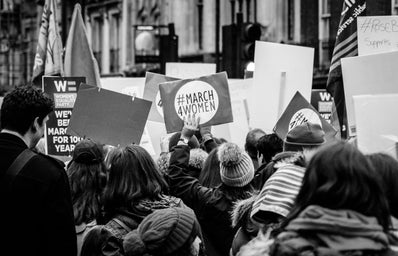WHAT HAPPENED?
On June 24, 2022, the Supreme Court overturned Roe v. Wade in a 5-4 vote. The majority opinion was written by Associate Justice Samuel Alito, with Justices Amy Coney Barret, Neil Gorsuch, Brett Kavanaugh, and Clarence Thomas voting to overturn it. Justices Stephen G. Breyer, Sonia Sotomayor, Elena Kagan, and John G. Roberts Jr. voted to uphold Roe v. Wade.
The Supreme Court voted on a ruling for Dobbs v. Jackson Women’s Health Organization, a case in Mississippi that bans most abortions after 15 weeks of pregnancy. The court voted 6-3, with John G. Roberts Jr. in support of the Mississippi Law.
Here are the final words from Sotomayor, Kagan, and Breyer about this decision.
When the court was ruling on Dobbs v. Jackson Women’s Health Organization, they stated that abortion was not a constitutional right, leading to the overturning of Roe v. Wade. Roe v. Wade was a landmark decision that legalized abortion federally, stating it was a constitutional right under the “Due Process Clause” of the Fourteenth Amendment.
Roe v. Wade being overturned is incredibly rare, being that it is not often that the Supreme Court overturns a case that takes away fundamental rights. It is usually the other way around.
Back in May, drafts of the decision were leaked. Many, including our own Genevieve Andersen, wondered what the possibility of Roe being overturned would look like: the weeks after were tumultuous, the fear incited in so many women across the country was evident, and the uncertainty of what could happen led to many what-if questions. On the morning of the news, the horrendous answer to those questions was absolutely heart-wrenching, but it was no surprise. The 1973 Roe v. Wade decision was also leaked before its official hearing, resulting in a delayed ruling.
WHAT DOES THIS MEAN?
Roe v. Wade being overturned means that abortion is no longer protected at the federal level. Due to this, states are now allowed to restrict or ban abortion as they so please. Twenty-six states, particularly across the South and Midwest, are expected to ban or restrict abortion access as soon as they can.
These states are Alabama, Arizona, Arkansas, Florida, Georgia, Idaho, Indiana, Iowa, Kentucky, Louisiana, Michigan, Mississippi, Missouri, Montana, Nebraska, North Dakota, Ohio, Oklahoma, South Carolina, South Dakota, Tennessee, Texas, Utah, West Virginia, Wisconsin, and Wyoming.
The consequences of Roe v. Wade being turned are not one size fits all. There are different types of abortion bans that have now taken place. To understand what this looks like across the country, visit this link.
ARE OTHER LAWS IN JEOPARDY?
Founding Fathers Thomas Jefferson and James Madison initially fought for religious freedom after feeling that it was unfair for people to support a church they might not follow through with mandatory taxes. Their fight was helped by other religious factions such as the Quakers and the Presbyterians, who wanted the ability to practice their own religions without interference. Thus, the establishment clause was created, which allowed religion and government to be separate entities so that religious freedom could be a part of the civil liberties guaranteed by the constitution.
However, “separation of church and state” is a constitutional provision that conservatives have always been able to conveniently ignore. Freedom of speech, freedom of expression, the right to bear arms, and other unalienable rights listed in our governing document are absolute necessities when it comes to American Democracy — except in the case that these rights infringe on the beliefs of a small population of extreme Christians in power who have been guided to their hateful ideology through misinterpreted bible verses and the desire to find a community of hate rather than a community of faith.
After all, if abortion was merely an ethical decision that had absolutely nothing to do with the religious bias that comes into play, then the pro-life party would also be the party of mask mandates, mandatory vaccines, maternity leave, and post-birth childcare. These issues of public health, safety, and childcare seem to be completely separated from the abortion issue. Being anti-abortion isn’t about protecting “babies,” it’s about enforcing religious extremist beliefs and control over women. Therefore, the “pro-life party” could be more accurately called “pro-forced birth” or “anti-choice.”
So this begs the question, “if the Supreme Court is okay with violating separation against church and state to wage a war on those who can get pregnant, mostly women, what else will they do?”
This question has already been answered by Justice Clarence Thomas himself.
In his concurring opinion on the Dobbs case, Thomas writes “we should reconsider all of this Court’s substantive due process precedents, including Griswold, Lawrence, and Obergefell.” Griswold v. Connecticut was a landmark case in 1965 that protected the right of married couples to buy and use contraceptives without government regulation. Lawrence v. Texas protected people in same-sex relationships from punishment in 2003. The most recent of these landmark cases is Obergefell v Hodges, which legalized same-sex marriage in 2016. These were cases that were all considered protected under the 14th amendment, as the Supreme Court had previously ruled that the “due process” clause found in Section 1 of the 14th amendment allows for a fundamental right to privacy. The rights to abortion, contraceptives, and same-sex marriages and relationships were all considered protected as they fell under the right to privacy that was provided for in this clause.
The Supreme Court is taking away power from women, members of the LGBTQ+ community, as well as the people of color and low-income communities that will be most affected by the Roe decision, due to their lessened ability to pay for transportation to a legal state, take time off work, and reach out to others in their communities for support. America is regressing thanks to the religious and political agenda of the extremist minority, putting us behind the entirety of the so-called “developed world.”
WHO IS AFFECTED?
Abortion cannot be banned. Safe abortion can be, but people will continue to get abortions. Women of color, those with documentation barriers, those who are gender-nonconforming, transgender individuals, and those who are not financially privileged will continue to be failed by the healthcare system – only now their fundamental rights have been stripped at a greater cost.
To women of color, yesterday’s ruling is a harsh reminder that systemic racism continues to put them in danger. Black and brown communities are at a very disproportionate disadvantage. Women of color already struggle to find adequate healthcare. Black and brown women have higher maternal mortality rates, and Black and Latina women have the highest abortion percentages.
Why? It’s because these systems keep failing us. It’s because we do not have the access to these same resources. We do not have the same access to health care, our schools do not receive the same funding, and the same states that ban abortion continue to pass laws that continue to put BIPOC individuals at these disadvantages. Roe v. Wade being overturned was a racist decision and one that will cost countless women their lives.
In the article linked above, you’ll see that women of color are often merely referred to as statistics. Our lives, our rights, and our existence are often reduced to just numbers. Our existence is so commodified, and this decision does not protect life, it reminds us that this system continues to jeopardize ours.
While the war on abortion has always been a war against women, it’s important to highlight that abortion is predominantly an issue of elitism. Privileged, wealthy, white women — including women who claim to be “pro-life” — have always and will always have access to abortions. Many pro-lifers even have gotten abortions, led by some delusion that their reasoning for doing it is somehow “different” while maintaining the belief that others going through the same experience are morally lesser.
In a scientific paper written about helping others in the face of conflicting values, data and research was found to support the idea that pro-lifers would support and even help facilitate an abortion if it was a loved one seeking treatment. Those who are anti-choice are only anti-choice when it comes to others, proving that this is a selfish movement that will only harm BIPOC, LGBTQ+ individuals, and those with low-income. It shows the anti-choice movement for what it really is: a racist, homophobic, elitist political agenda that is weakly disguised under “ethics” and ”the sanctity of life”.
WHY IS THIS HAPPENING?
We know beyond the fact that the overturning of Roe v. Wade has absolutely nothing to do with the protection of life. We can see how on both sides of politics, at all levels of government, a severe lack of action and inconsideration for the public’s wishes has prevailed through the refusal to pass or codify laws and precedent that do protect and honor human life. So if this is all happening, but we know it was never for the reasons they’ve shoved down their ignorant supporter’s throats, we must ask and remember the honest intention of our American institution of courts and government – to maintain the power of the elite.
Roe v. Wade protects a person’s right to privacy, the right to their own body, including their right to independently decide when, if, and how to reproduce. Taking this away from the fundamental rights embedded in the law of the land, which is solely written by the elite, is a crime against humanity that confirms how the rich have the power to decide which of their citizenry gets to live a dignified life, while directly imposing death, suffering, and immobility on those who they deem as disposable. This fascinatingly sick reality of the way the rich impose their Biopower on the working class is explained by Jonathan Xavier Inda, a Chicano researcher from UC Santa Barbara.
Essentially, when people who are able to reproduce lose their ability to decide the fate of their own bodies and lives, it places them in an inferior power dynamic with those who do get to decide for them (the government, fathers, husbands, etc.).
Why is this important for the elite, and why is this fight for reproductive rights predominately a class war? For elitist, globalized, imperialist capitalism to persist, the wealthy must be able to regulate and control the choices, health, bodies, and lives of the working class. As the working class, the bottom 95% of wealth holders in the United States, we are the production of their profits and their control over our beings promises them their maximum. Working class people, often Brown and Black, with inadequte access to financial or healthcare privelleges, will likely die, (as many poverty-ridden and undocumented women already do) from this decision, as they scramble to get abortions in backdoor, homemade, unregulated, and unsafe ways. If people decide to “spare” their lives and carry through with an unwanted pregnancy, their children, who will be Black/Brown and poverty-ridden as well, will become the next generation of underpaid laborers, the next generation of soldiers to die in pointless wars, the next generation to pay for the elite’s indulgences with their blood that lingers in the hands of gun lobbyists, big pharma lobbyists, and oil lobbyists.
Either way, taking away choice allows the elite to kill off “unfit” mothers (see research on forced sterilization and eugenics), while simultaneously allowing them to force the production of a highly populated next generation of disposable workers.
HOW CAN YOU GET INVOLVED?
It’s easy to lose hope, and feel like there is nothing that can be done. However, together we can make a difference. Community action can lead to substantial, societal change and it starts with one person. By taking these steps, we can ensure that Roe v. Wade, and so many other laws impacting marginalized communities are codified.
- Educate yourself and your community on the movements that have been going on for decades in other countries, and how these activists are mobilized to assist those impacted in the United States. Learn from people who have given their lives to this fight. Revolutionary Latina Pro-Abortion Feminists have been fighting this battle furiousously, from Argentina to Mexico, by demanding loudly access to safe and legal abortion. People in Latin America know disgustingly too well how violent the world can get for women for simply existing as women. Taking away a fundamental human right like privacy in reproductive healthcare and abortion is political feminicide, #NiUnaMenos, because no one is safe unless we are all safe. Mexicana feminists have set up organizations across the border to help Americans (who have had their rights stripped from them) through their abortions, guiding them through the World Health Organization’s protocol for safely using abortion pills without the supervision of a doctor. They also supply abortion pills to Americans at no cost, mailing donated medications to the United States. Abortion Pills are also avaliable through aidaccess.org.
- Call and email your representatives. Our elected officials need to understand that we are angry, and we expect them to do better. Find your House representative here and your Senators here. Furthermore, if you live in a state like Kentucky or Kansas where state abortion bans are on the ballot this November, contact your local representatives as well. It is important to address this issue on every level of government.
- Attend protests. Throughout the next few weeks, there are a series of protests happening across the country. Our fundamental rights are being ripped away, but by protesting, we can show that we will not be complacent. What is happening is especially heart-wrenching because for decades, so many women have been showing up and giving their lives so we could have the very same rights that just yesterday were taken away from us. For them, and for those who now have to live in the same fear they thought we would no longer have to, we must make noise.
- If you have the ability to do so, VOTE. Abortion rights will be the biggest issue on the ballot this November, and we must elect those who will codify laws that guarantee we will have rights over our own bodies. For too long now, those in power continue to strip us of our bodily autonomy and we cannot allow for it to happen any longer. Democracy is failing us but by voting, we can elect those who care about our fundamental rights.
- Donate! Finances are a major barrier for many people seeking an abortion, and donating to abortion providers is one way to ensure anyone can get the care that they need. While donating to organizations like Planned Parenthood is important, it is critical that we also donate to smaller clinics who have less funding. Use this link to donate to a local abortion fund. (And feel free to donate in the name of one of the justices…)
WHAT STEPS CAN YOU TAKE TO PROTECT YOURSELF?
- Learn about the abortion laws in your state.
Now that Roe v. Wade has fallen, abortion rights are up to each individual state. Unfortunately, that means that the states with trigger laws previously in place have now banned abortion. However, some states like California and Massachusetts are expanding abortion access. Check out this map to stay up to date about the laws where you live.
- Have a backup plan.
If you live in a state where abortion is illegal, learn where the nearest accessible abortion clinic is. Websites like Abortion Finder can help you find a provider based on your location, age, and how far along you are in your pregnancy.
If you are comfortable, also make sure to have a conversation with your partner, out-of-state friends, or anyone else you feel safe discussing abortion with. Having that support system will be incredibly helpful if you find yourself in a position where you need an abortion.
- Delete online period tracking apps.
Privacy experts have expressed concerns that private corporations or the government could have access to data on apps like Flo. Simply put, the fear is that if you become pregnant and choose to seek an abortion in a state where it is outlawed, the government could see that you missed your period and could have reason to prosecute you. While this has NOT been confirmed, many people who menstruate are choosing to delete their apps now as a precaution.
- Sign up for a birth control/Plan B subscription.
Some birth control organizations like Favor can send you monthly Plan B at a low cost. Plan B can also be purchased on Amazon. If you are a college student, also look into getting a birth control prescription at your university’s health center. While it is rumored that the Supreme Court will try to restrict birth control, currently it is still available and legal.
This is a terrifying decision, and one that should not have happened. So much is at stake, and if we do not take action, it can only continue to get worse.





